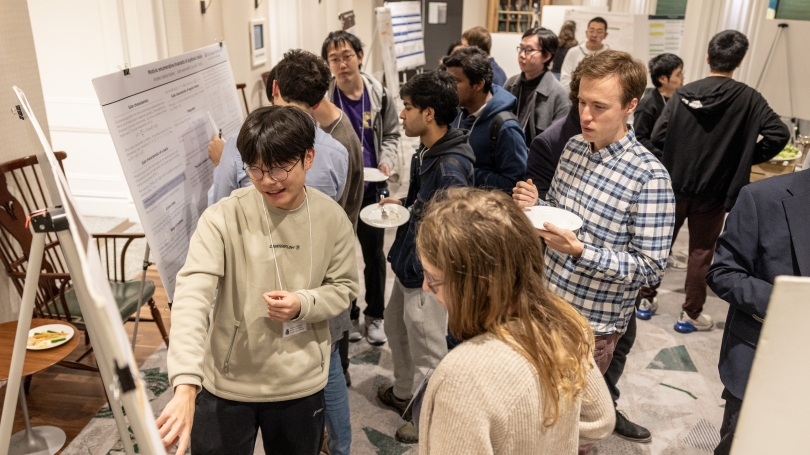

More than 150 early-career math scholars convened on campus Nov. 8–10 for the Algebraic Geometry Northeastern Series conference, which was held at Dartmouth for the first time.
Three math professors took the lead in bringing a major algebraic geometry conference to Dartmouth for the first time.
The Algebraic Geometry Northeastern Series conference (AGNES) took place at Dartmouth Nov. 8–10 and brought nearly 150 early-career math scholars to campus. Professors Asher Auel, Juliette Bruce, and Salim Tayou served on the conference organizing committee alongside math postdocs Sarah Frei, Andrew Hanlon, and Tristan Phillips. Math department administrator Tracy Moloney also played a crucial role in bringing the conference to Dartmouth.
"Hosting AGNES on campus puts Dartmouth on the map as a major center for algebraic geometry research, and highlights the strength of the algebraic geometry research group in the mathematics department," Tayou says.
AGNES is hosted biannually, on a rotating basis, by a consortium of colleges and universities in the Northeast, including Boston College, Brown University, Columbia University, Harvard University, MIT, Northeastern University, Princeton University, Rutgers University, State University of New York at Stony Brook, University of Connecticut, University of Massachusetts at Amherst, University of Pennsylvania, and Yale University. Dartmouth joined the consortium last spring, soon after Auel first pitched hosting the conference to the leadership team.

The conference featured presentations by established researchers, short talks, a poster session, and a training session on computer algebra platforms designed to introduce graduate students to the modern software widely used in algebraic geometry research.
Former Dartmouth postdocs Edgar Costa and Eran Assaf, both research scientists at MIT, led the training session, which was first conceptualized by Auel and research professor John Voight. Department systems administrator Šarūnas Burdulis implemented an innovative online platform for accessing the computer algebra system.
The session highlighted Dartmouth's recent participation in a seven-year $14 million collaborative research grant from the Simons Foundation (with Boston University, Brown University, Harvard University, and MIT) focused on computational aspects of number theory and algebraic geometry. Voight served as the Dartmouth co-PI on the grant, which funded many week-long computational infrastructure workshops at Dartmouth as well as several postdoctoral positions.
'A very formative experience'
The majority of conference participants were graduate students, including eight from the Department of Mathematics.
"It's a great opportunity for postdocs and graduate students to meet senior researchers, network with peers from other institutions, and present their research, some of them for the first time, whether by giving a short talk or presenting a poster," Tayou says.
Benjamin Singer '27, who is pursuing a double major in math and music, presented a poster based on research he conducted this past summer with Auel.

"The conference was an incredible experience!" he says. "Although the initial setup of algebraic geometry is simple, it gets incredibly difficult very quickly. Getting to see the full breadth of this complexity through each of the talks was awe-inspiring. Pure math—especially a field as deep and complicated as algebraic geometry—can sometimes feel esoteric and isolating, but events like these are a reminder that there are so many people out there who are just as passionate about it as me and just as eager to learn and pursue it. I think that in the future, I will look back on this conference as a very formative experience in my mathematical journey."
Singer's poster tackled the "magic square of squares" problem: Does a 3 x 3 magic square—a 3 x 3 grid of numbers whose sums across each row, column, and diagonal are equivalent—comprised entirely of distinct square integers exist?
This is a question that "seems simple," Singer says, but has remained unsolved for centuries. "With my approach, the problem boils down to using various techniques from algebraic and differential geometry and topology to try to find a point with distinct rational coordinates on the algebraic variety the equations cut out," he says. "The project is still a work in progress, but I hope to publish my results at some point in the future!"
Promoting gender equity
The conference also offered a Gender Equity in Mathematical Studies (GEMS) gathering to build community among women and gender minorities in algebraic geometry, as well as allies who wish to actively support and promote gender equity in the field.
"AGNES has a long tradition of hosting special events aimed at building community for women working in algebraic geometry," Auel says. "The GEMS event builds on that momentum and aims to subtly shift the focus of such events from building community to building equity."
The session builds on the mathematics department's long history of supporting and promoting gender equity in the field. Emeritus professor Carolyn Gordon, for example, previously served as the president of the Association for Women in Mathematics and launched numerous related events at Dartmouth, including Sonia Kovalevsky Day, a day-long program of workshops and talks for middle and high school students and their teachers (now led by professors Rosa Orellana and Ina Petkova); and the department's Student Essay Contest, which invites middle and high school students to interview a woman whose career uses mathematics and write a bibliographic essay.
"Seeing yourself as part of a thriving research community is so important at every level, and perhaps especially for members of minoritized groups in mathematics, which is why events like GEMS are so important," Auel says.